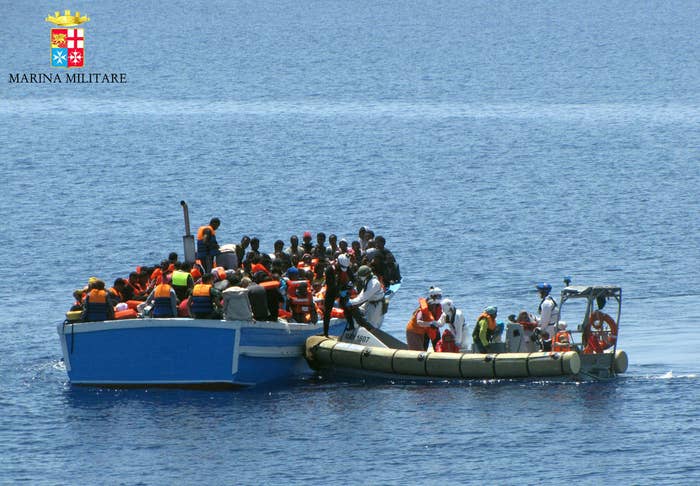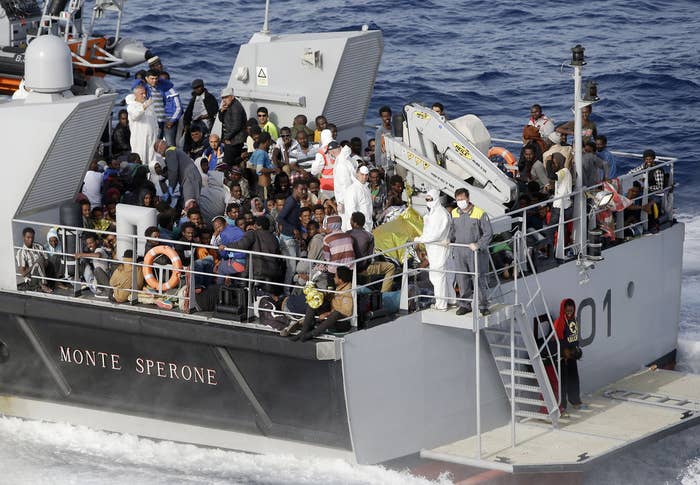
EU foreign and defense ministers gathered in Brussels on Monday and voted in favor of a military mission against the smugglers currently trafficking hundreds of people a day into Europe through the Mediterranean sea.
The mandate, with the United Nations consent, will allow EU forces to destroy -- at sea -- the boats used by the smugglers in the perilous crossing.
The vessels, often wooden-made and unseaworthy, mostly depart from war-torn and politically fragmented Libya and are packed to the brim with hundreds of people desperate to flee poverty and conflict in Africa and the Middle East.
Ahead of the meeting on Monday, EU Foreign Policy Chief Federica Mogherini said she expected the military operation to be launched in the "coming weeks."
Mogherini also said she was looking to make "partnerships with the Libyan authorities," something which would "facilitate a resolution in the Security Council."
Cooperation from Libyan officials might be hard to come by, however.
The country is currently split, with an amalgamation of armed groups running the central and western region, including the capital Tripoli, while the democratically elected government led by prime minister Abdullah al-Thinni operates from Libya's second city, Benghazi.
European officials, wary of any further military involvement in the Middle East, have categorically ruled out the possibility of any boots on the ground in Libya.
But speaking to BuzzFeed News on Monday, Claire Spencer, Middle East and North Africa expert at Chatham House, said that's precisely the key in the battle against the smugglers.
"What we need to do is go back to the point where we ask at what cost we can actually allow a fluidity to migration," Spencer said. "The military option proposed by Mogherini is not without its weaknesses, they should actually be going after the trafficker networks in Libya, but for that you need boots on the ground."

Convening in Brussels last week, EU officials unveiled a plan to deal with the hundreds of migrants who continue to arrive on southern European shores on an almost daily basis.
Under the proposed measures, European officials presented an "EU-wide resettlement scheme to offer 20,000 places", to be distributed proportionally among all EU countries, over the next two years.
EU officials, mindful of the rising anti-immigration sentiment among the European electorate, also plan to tackle the issue at the source by setting up a Common Security and Defense Policy operation in the Mediterranean. The operation would dismantle -- by force if necessary -- the people's smugglers networks, as well as destroy their infrastructure. The military option, however, will first have to be approved by EU Foreign and Defense Ministers.
Most of the boats heading to southern Italy, Greece, Malta or Spain, depart from war-torn Libya or politically unstable Egypt.
When it comes to rescuing boats packed to the brim in the middle of the Mediterranean sea, Frontex — the EU border agency — will receive an additional $100 million in funding over the next two years.
But with almost 1,800 migrants killed in the Mediterranean so far this year, critics say the new measures proposed by European officials are just not enough.
"Given the high number of asylum seekers and refugees who put their lives in the hands of traffickers and smugglers, States need to increase safe alternative routes for those most in need of protection to enter Europe," Save the Children CEO Justin Forsyth said in an email to BuzzFeed News.
Against a background of financial woes and political divisiveness affecting a number of European countries, EU Foreign Policy Chief Federica Mogherini described the new measures agreed by the European Commission to combat illegal migration as "bold."
"With this bold agenda, the European Union has proven itself ready to address the plight of those escaping from wars, persecution and poverty. Migration is a shared responsibility of all Member States and all member States are called now to contribute to tackling this historical challenge."
Speaking to BuzzFeed News last week, Medecins Sans Frontieres (Doctors Without Borders) Director for Humanitarian Affairs Hernan del Valle said it was "shocking" that EU politicians were just letting people drown at sea and that claims by some European countries that there isn't enough resources to receive and rescue that many migrants "needs to be questioned."
That assessment is also shared by Forsyth.
"The UK has a resettlement scheme for the most vulnerable Syrian refugees, but has resettled fewer than 200 people so far. Whilst the fate of economic migrants is debated, it's crucial that the Syrian children fleeing extreme danger aren't forgotten."
